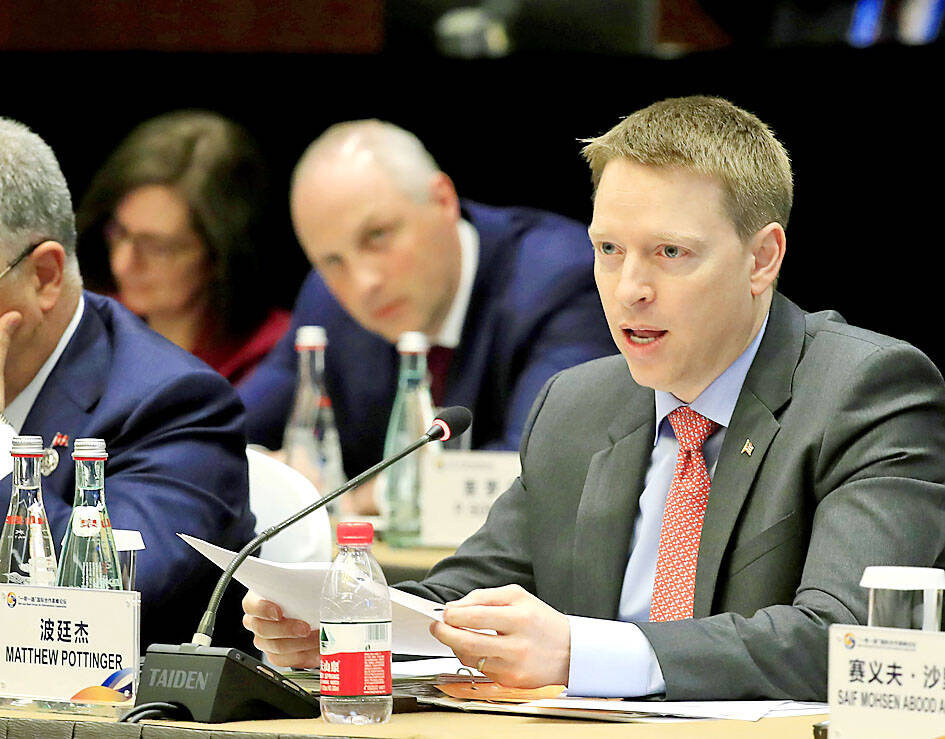Annexing Taiwan would be Beijing’s first step toward global domination, former US deputy national security adviser Matthew Pottinger said on Monday.
Pottinger made the remarks in an online seminar, titled “The View of the Taiwan Strait from the US-Japan Alliance,” held by the RAND Corporation, Radio Free Asia reported.
The world lacks understanding of Chinese President Xi Jinping’s (習近平) long-term ambitions for the world, which is not only to remove US influence in the Asia-Pacific region, but also to put international order under Chinese control, he said.

Photo: AP
If the international community wants to prevent a war in the Taiwan Strait, the US, Japan and other countries should “dent China’s confidence in wars” and let it know that invading Taiwan would be “very likely to fail and take ages,” he added.
Pottinger called on the US and Japan to “make a clearer promise to Taiwan regarding its security” so that Beijing would not think that the US is too afraid to make a promise and resort to force against Taiwan.
Taiwan has to show the will to safeguard its land, freedom and sovereignty, which is the decisive factor in deterring China from using force, he added.
“No war results from accidents,” he said, adding that wars usually break out because the aggressor is too optimistic about its power and thinks the benefits of starting a conflict outweigh those of solving problems peacefully.
Taiwan should provide more comprehensive military training to its recruits to show China the possible costs of an invasion, he said.
Cortez Cooper, a senior researcher on international and national security issues at the RAND Corporation, pointed to Taiwan’s strategic importance.
Taiwan is crucial to Japan and the US’ allies in the region, as it is in the middle of the first island chain, which straddles crucial international shipping routes, he said.
In addition, the international community relies heavily on Taiwan’s semiconductor industry, he said, adding that the nation is also the “beacon of democracy in Asia.”
Beijing has no intention of solving cross-strait issues peacefully, which is evident in its control of Hong Kong, so the US cannot let Taiwan fall into the hands of an authoritarian regime, he said.
Asked whether the adoption of clear strategies on Taiwan by the US and Japan might exacerbate cross-strait tensions, Cooper said that letting Beijing know that the US and Japan have made promises to Taiwan can “effectively deter China’s expansion.”
Yasuhiro Matsuda, a professor of international politics at the University of Tokyo, said the US has a responsibility to protect Taiwan.
If China annexed Taiwan, Japan would have doubts over the US’ security promises and defense capability, Matsuda added.
Separately, Deputy Minister of Foreign Affairs Tsai Ming-yen (蔡明彥) told Sky News on Monday that “China is using the Taiwan Strait as a playground” to test the bottom line of the international community.
China has taken more abrasive and provocative actions against Taiwan, including sending fighter jets into the skies around Taiwan and launching large-scale military drills near the country, which showed its ambition to unilaterally change the “status quo” across the Taiwan Strait, he said.
China’s ambition poses threats not only to Taiwan, but also to the rest of the world, he added.
Additional reporting by Lu Yi-hsuan

Chinese Nationalist Party (KMT) Chairman Eric Chu (朱立倫), spokeswoman Yang Chih-yu (楊智伃) and Legislator Hsieh Lung-chieh (謝龍介) would be summoned by police for questioning for leading an illegal assembly on Thursday evening last week, Minister of the Interior Liu Shyh-fang (劉世芳) said today. The three KMT officials led an assembly outside the Taipei City Prosecutors’ Office, a restricted area where public assembly is not allowed, protesting the questioning of several KMT staff and searches of KMT headquarters and offices in a recall petition forgery case. Chu, Yang and Hsieh are all suspected of contravening the Assembly and Parade Act (集會遊行法) by holding

PRAISE: Japanese visitor Takashi Kubota said the Taiwanese temple architecture images showcased in the AI Art Gallery were the most impressive displays he saw Taiwan does not have an official pavilion at the World Expo in Osaka, Japan, because of its diplomatic predicament, but the government-backed Tech World pavilion is drawing interest with its unique recreations of works by Taiwanese artists. The pavilion features an artificial intelligence (AI)-based art gallery showcasing works of famous Taiwanese artists from the Japanese colonial period using innovative technologies. Among its main simulated displays are Eastern gouache paintings by Chen Chin (陳進), Lin Yu-shan (林玉山) and Kuo Hsueh-hu (郭雪湖), who were the three young Taiwanese painters selected for the East Asian Painting exhibition in 1927. Gouache is a water-based

Taiwan would welcome the return of Honduras as a diplomatic ally if its next president decides to make such a move, Minister of Foreign Affairs Lin Chia-lung (林佳龍) said yesterday. “Of course, we would welcome Honduras if they want to restore diplomatic ties with Taiwan after their elections,” Lin said at a meeting of the legislature’s Foreign Affairs and National Defense Committee, when asked to comment on statements made by two of the three Honduran presidential candidates during the presidential campaign in the Central American country. Taiwan is paying close attention to the region as a whole in the wake of a

OFF-TARGET: More than 30,000 participants were expected to take part in the Games next month, but only 6,550 foreign and 19,400 Taiwanese athletes have registered Taipei city councilors yesterday blasted the organizers of next month’s World Masters Games over sudden timetable and venue changes, which they said have caused thousands of participants to back out of the international sporting event, among other organizational issues. They also cited visa delays and political interference by China as reasons many foreign athletes are requesting refunds for the event, to be held from May 17 to 30. Jointly organized by the Taipei and New Taipei City governments, the games have been rocked by numerous controversies since preparations began in 2020. Taipei City Councilor Lin Yen-feng (林延鳳) said yesterday that new measures by